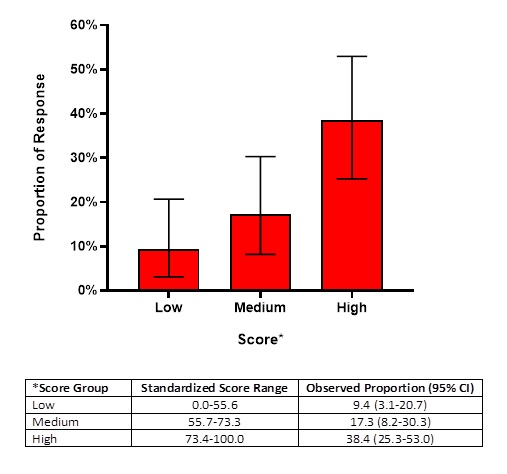Session Information
Session Type: Poster Session A
Session Time: 9:00AM-11:00AM
Background/Purpose: Codeine, a widely prescribed analgesic, is an inactive pro-drug that is metabolized to morphine, the active drug, by cytochrome P450 2D6 (CYP2D6), a highly polymorphic enzyme. However, the impact of CYP2D6 metabolizer status on pain control in patients receiving codeine in real-world clinical practice is still poorly defined. We examined the hypotheses that among patients prescribed codeine (1) CYP2D6 poor and intermediate metabolizers have poorer pain control than normal or ultrarapid metabolizers; and (2) a response score combining clinical data with CYP2D6 phenotype is associated with pain response in real-world clinical practice.
Methods: We studied 157 patients with a baseline pain score higher than 4 (0-10 scale) who received codeine and had complete clinical data using a DNA biobank linked with electronic health records (EHRs). The primary outcome was pain response, defined as pain score of 4 or lower while receiving codeine. Clinical variables were collected from EHRs and a propensity score developed to adjust for potential confounders. Patients were classified as poor (PM), intermediate (IM), normal (NM), or ultrarapid CYP2D6 metabolizers (UM) based on CYP2D6 genotyping. To discriminate between patients who responded and who did not respond to codeine, we built a score that included clinical variables and CYP2D6 phenotype.
Results: There were 69 PM or IMs and 88 NM or UMs. Among the PM and IMs, the response rate was 14% (10 out of 69), compared to 27% among the NM or UM metabolizers (24 out of 88), p=0.08. After propensity score adjustment, the odds ratio of achieving a pain score of 4 or lower was 0.35 (95% CI: 0.14-0.84, p=0.02) among PM or IMs. The response rate was 38.5% (95% CI=25.3-53.0%) among patients in the high, 17.3% (95% CI: 8.2-30.3%) in the intermediate, and 9.4% (95% CI: 3.1-20.7%) in the low response score groups, respectively (p=0.001) (Figure).
Conclusion: The analgesic effect of codeine was lower among PM and IMs than in NM and UMs. A score based on CYP2D6 phenotype and clinical variables improved the discrimination between analgesic response and non-response to codeine in real-world clinical practice.
To cite this abstract in AMA style:
Carranza Leon D, Dickson A, Gaedigk A, Stein C, Chung C. CYP2D6 Genotype and Reduced Codeine Analgesic Effect in Real-World Clinical Practice [abstract]. Arthritis Rheumatol. 2020; 72 (suppl 10). https://acrabstracts.org/abstract/cyp2d6-genotype-and-reduced-codeine-analgesic-effect-in-real-world-clinical-practice/. Accessed .« Back to ACR Convergence 2020
ACR Meeting Abstracts - https://acrabstracts.org/abstract/cyp2d6-genotype-and-reduced-codeine-analgesic-effect-in-real-world-clinical-practice/

